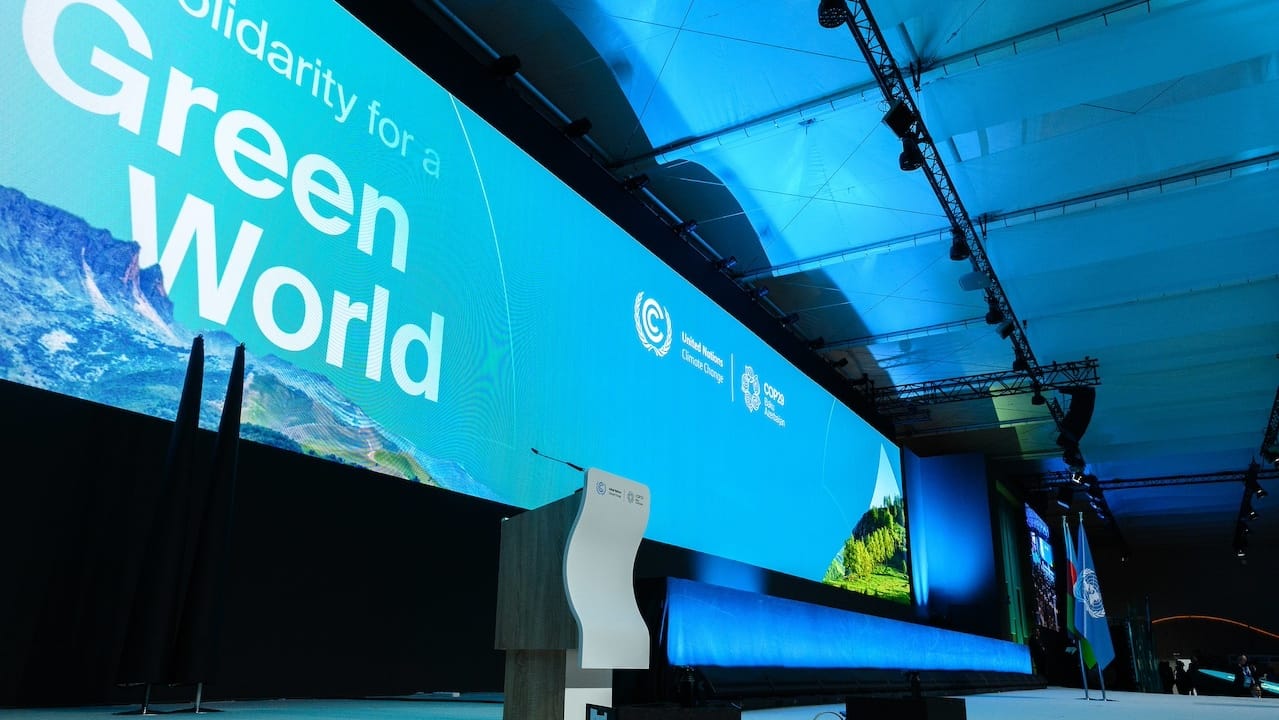Hey there,
COP29 wrapped up this week, and to no one’s surprise deliver some underwhelming results. We’ll unpack some of the main agreements, including a $300B per year commitment for climate finance. It’s easy to trash talk summits like this where progress is slow and uneven, but they keep countries coming to the table each year. That’s gotta count for something, right?
In other climate news, Vicinity Motor Corp and Lion Electric are facing financial challenges as they try to scale up their electric buses and trucks, Alvéole launched a new biodiversity platform that leverages their honeybee hive network, and Cascadia Seaweed raised an initial $4M for seaweed-based fertilizers and feed.
P.s. Help us grow by sharing the newsletter with someone in your network! And if you’re that someone, subscribe below 👇
TECH
Electric bus makers hit the brakes

Credit: Vicinity Motor Corp
What happened: Two heavy-duty electric vehicle makers are facing tough financial challenges. Vicinity Motor, a B.C.-based electric bus and truck maker, entered receivership after failing to repay loans totalling more than $22 million. Meanwhile, Quebec’s Lion Electric announced it’s exploring a sale as part of restructuring efforts after a $33.9 million loss in Q3.
The context: Vicinity took on significant debt to finance operations. And while it built a strong order backlog, it ultimately didn’t convert to revenue fast enough.
Meanwhile, Lion struggled with lower sales, higher manufacturing costs from ramping up new vehicle platforms, and delays in federal subsidies for municipalities to buy electric buses.
Why it matters: These setbacks could slow down the adoption of zero-emission buses and trucks by creating uncertainty for customers that their suppliers will still be around in the future. Some have already been burned by Proterra’s bankruptcy earlier this year.
However, it’s not all bad news: electric bus manufacturer New Flyer continues to expand, and recently announced it’s bringing end-to-end manufacturing to its Winnipeg facility.
The bottom line: Operating in capital-intensive sectors is no easy feat, where companies need to constantly balance cashflow, debt, sales, etc while scaling up new technologies. The two companies are still exploring options to keep their operations running, including plans from Lion to start selling its batteries to other manufacturers.
SPONSORED BY MORNING BREW
The gold standard of business news
Morning Brew is transforming the way working professionals consume business news.
They skip the jargon and lengthy stories, and instead serve up the news impacting your life and career with a hint of wit and humor. This way, you’ll actually enjoy reading the news—and the information sticks.
Best part? Morning Brew’s newsletter is completely free. Sign up in just 10 seconds and if you realize that you prefer long, dense, and boring business news—you can always go back to it.
CLIMATE CAPITAL
🌊 Cascadia Seaweed (Sidney, BC) closed an initial $4 million in Series A funding led by WWF Impact. Cascadia is cultivating seaweed to produce regenerative fertilizers and livestock feed.
🤖 Swap Robotics (Waterloo, ON) secured a $3 million strategic investment from solar panel tracking company ARRAY Technologies. Swap Robotics develops electric robots to manage vegetation around solar panels. The investment is part of an ongoing Series A round, and will be used for global expansion.
🔋 EECOMOBILITY (Hamilton, ON) closed a Seed raise for an undisclosed amount led by RiSC Capital for their battery testing and monitoring software. The company was spun out from McMaster University’s Centre for Mechatronics and Hybrid Technology.
☀ Silfab Solar (Mississauga, ON) raised $100 million in new financing to scale its solar cell manufacturing plant. The raise includes a $50 million equity investment led by ARC Financial and a $50 million loan.
MILESTONES & PRODUCT
🐝 Montreal’s Alvéole launched a new nature-related risk platform for commercial real estate. The platform leverages data from Alvéole’s urban honeybee hives and satellite data.
🥶 Evercloak joined the Wells Fargo Innovation Incubator, landing $250K and access to the U.S. National Renewable Energy Laboratory to test its dehumidification technology.
⚡ One of the world’s top three steelmakers will test PyroGenesis’ electric plasma torches for use in electric arc steelmaking furnaces.
🧱 CarbiCrete received the first-ever Environmental Product Declaration for cement-free concrete. CarbiCrete produces just 11.7 kg of CO2 per cubic metre vs the typical 410 kg.
NEWS
COP29 falls short for developing countries

Credit: COP 29
What happened: COP29 wrapped up with a new climate finance goal for developing countries, but well below what’s needed.
In the final deal, developed nations agreed to mobilize at least $300B annually for climate projects in developing nations. It’s a dismal result for developing nations who were calling for $1.3T, and far off the $2.3T many economists say is actually needed.
The context: Climate finance has consistently underdelivered on its promises. The previous goal of $100 billion per year (set in 2009) was met for the first time in 2022, two years late. The public funding is intended to unlock additional funding from the private sector,
Why it matters: Climate finance is critical for developing nations to adapt to the impacts of climate change and adopt climate solutions like clean energy. Many developing countries have contributed the least to climate change, but face the most severe consequences. Climate finance can help increase standards of living without relying on the polluting fossil fuel systems that developed nations were able to exploit in their own growth.
Not all lost: Despite the underwhelming results on climate finance, COP29 did include some wins. The summit delivered an agreement on Article 6 to establish international carbon markets, operationalizing the Loss and Damage Fund, and a commitment to no new unabated coal plants from Canada, the EU and 25 others.
What’s next: A lot remains up in the air and a final number will continue to be negotiated at next year’s COP in Brazil. There, discussions will need to focus on what kinds of funding - e.g. loans vs grants - count towards the goal, as well as cutting bureaucratic bottlenecks to deploy funding quickly.
Enjoying the newsletter? Help spread the word!
Share Climate Tech Canada with your network and earn rewards.
IN THE NEWS
🚫 Quebec plans to ban natural gas in all buildings by 2040, replacing it with electricity or renewable natural gas (RNG). The plan follows similar bans on natural gas for new homes in several Quebec municipalities. However, RNG’s emissions are only ~50% less than conventional natural gas.
🏦 Northvolt filed for bankruptcy and CEO Peter Carlsson stepped down. The company, which has US$5.84B in debt, will now go through a restructuring process with its creditors, including several Canadian pension plans. Northvolt said its Canadian business is financed separately, and will continue to operate.
🚨 Former Quebec pension fund staff were charged with bribery in solar deals. The Caisse de dépôt et placement du Québec employees allegedly paid more than $250M in bribes to secure solar energy contracts for Azure Power Global and Adani Green Energy. CDPQ is an investor in both companies.
🤝 B.C. debuts dedicated Ministry of Energy and Climate Solutions. Bringing together energy and climate could help align the portfolios, but will also present competing priorities: expanding energy projects (including B.C.’s natural gas sector) while meeting climate goals.
BIG PICTURE
Green steel needs 10x more clean energy to scale
BlackRock, Block buy $200M in clean jet fuel
The U.S. awards $2.2B for green hydrogen hubs
A new bipartisan bill wants to offer IRA-style incentives for carbon removal
GM, Ford ask Trump to keep EPA rules on tailpipe emissions
Texas wants to lead on advanced nuclear
Oil majors are betting big on biofuels
Electricity access expands after the first setback in decades
COMMUNITY
🚀 MaRS Climate Impact: This event brings together the world’s foremost tech and finance leaders to speed up the adoption of climate solutions. Toronto, Dec 3-4th.
➡ Discover more climate events.
🗓 Green Energy Doors Open Symposium: Hosted by the Ontario Sustainable Energy Association, the symposium explores the latest developments in clean energy policy, technology, and business. Toronto, Nov 28th.
💻 Ayrton Energy is hiring a Director of Business Development to lead the commercialization of their hydrogen storage technology.
➡️ Find more open roles.
Share Climate Tech Canada with your network and help us grow! Make {{ rp_num_referrals_until_next_milestone }} referrals to get a {{ rp_next_milestone_name }}. See all rewards here.

